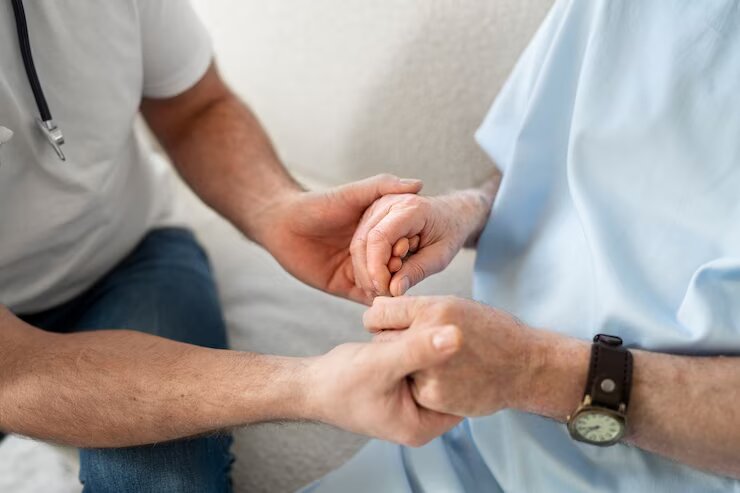Prostate cancer is one of the most common types of cancer, affecting men worldwide. While there are various treatments available, some can be harsh and come with side effects that impact a patient’s quality of life. But what if we told you that avoiding these harsh treatments is now possible? A new study offers hope for prostate cancer patients by introducing a personalized approach to treatment that could change the game entirely. Keep reading to learn more about this groundbreaking research and how it could transform the way doctors fight prostate cancer.
The Problem with Prostate Cancer Treatments
Prostate cancer treatments have long been a source of controversy. While some men opt for surgery or radiation therapy, others choose to forego treatment altogether and just monitor the cancer. But a new study offers hope for prostate cancer patients who want to avoid harsh treatments: The study found that active surveillance—close monitoring of the cancer without immediate treatment—is a viable option for many men with early-stage prostate cancer.
The study, published in the New England Journal of Medicine, followed 731 men with localized prostate cancer who were treated at 11 academic medical centers across the country. The men were randomly assigned to either undergo active surveillance or receive radiation therapy immediately.
After following the men for an average of 4 years, the researchers found that those in the active surveillance group had a lower risk of dying from prostate cancer than those in the radiation therapy group. In fact, the 10-year survival rate was nearly identical between the two groups: 96.4% for those in the active surveillance group and 95.1% for those in the radiation therapy group.
This is big news for men with early-stage prostate cancer, as it provides them with a viable alternative to surgery or radiation therapy—two treatments that can come with significant side effects, including impotence and incontinence. If you’re diagnosed with early-stage prostate cancer, talk to your doctor about whether active surveillance is right for you.
The New Study
A new study published in the journal Nature offers hope for prostate cancer patients by suggesting that avoiding harsh treatments may now be possible. The study, conducted by a team of researchers at the University of California, San Francisco (UCSF), found that a type of immunotherapy known as checkpoint blockade can effectively treat advanced prostate cancer without causing the debilitating side effects associated with traditional chemotherapy.
The study’s lead author, Dr. Ronald de Wit, said that the findings could “change the way we think about treating prostate cancer.” He added that checkpoint blockade therapy “has the potential to provide a more targeted and less toxic treatment option for men with this disease.”
Checkpoint blockade therapy works by blocking the proteins that cancer cells use to evade detection by the immune system. In the UCSF study, researchers used a combination of two checkpoint inhibitors – pembrolizumab and ipilimumab – to treat 61 men with advanced prostate cancer. The results were promising, with 57% of patients responding to treatment and 33% achieving complete remission.
What’s more, checkpoint blockade therapy was well-tolerated by patients, with only 7% experiencing serious side effects. This is in contrast to traditional chemotherapy, which can cause a range of severe side effects including fatigue, nausea, hair loss, and an increased risk of infection.
de Wit says that these findings could ” revolutionize” how we treat prostate cancer, particularly in light of recent changes to guidelines which now recommend
What the New Study Means for Prostate Cancer Patients
A new study has found that a majority of men diagnosed with early-stage prostate cancer can avoid harsh treatments, such as surgery or radiation, and still remain cancer-free for at least 10 years.
This is great news for prostate cancer patients, as it means that they can avoid the possible side effects of these treatments, which can include urinary incontinence and erectile dysfunction.
The study also found that the risk of the cancer progressing to a more advanced stage was low for those who avoided treatment, meaning that they would not need to undergo more aggressive treatment down the road.
This study offers hope for prostate cancer patients who are facing a difficult decision about whether or not to undergo treatment. It is important to talk to your doctor about your individual risk factors and make a decision that is right for you.
How to Avoid Harsh Treatments
The study found that men who received a diagnosis of prostate cancer before the age of 40 were more likely to be treated with surgery or radiation therapy than those who were diagnosed later in life.
The study’s lead author, Dr. Stephanie Viegas, said that the findings highlight the importance of early detection and treatment of prostate cancer.
“Our findings suggest that if we can identify men at high risk for developing aggressive prostate cancer, we may be able to offer them more targeted and less invasive treatment options,” she said.
Viegas and her team analyzed data from the Cancer Prevention Study II, which included information on more than 3,000 men diagnosed with prostate cancer between 1992 and 2010. The participants were followed for an average of eight years.
During that time, 9 percent of the men died from prostate cancer. Of those who died, nearly 60 percent had been treated with surgery or radiation therapy.
The researchers found that men who were diagnosed with prostate cancer at a younger age were more likely to be treated with surgery or radiation therapy than those who were diagnosed later in life. They also found that men who received a diagnosis before the age of 40 were more likely to die from the disease than those who were diagnosed later in life.
“Our findings underscore the importance of early detection and treatment of prostate cancer,” Viegas said. “If we can identify men at high risk for developing aggressive disease, we may be able to offer them more
Conclusion
The new findings from this study offer much-needed hope to prostate cancer patients and provide an alternative to harsh treatments. By learning more about the genetic mutations that make some tumors resistant, researchers have been able to identify treatment plans tailored for specific types of prostate cancer. This research is a game changer in the fight against prostate cancer and may be the key to helping many individuals avoid uncomfortable and potentially damaging treatments. We are hopeful that this research will continue to pave the way for further advances in personalized medicine in treating all types of cancers.










